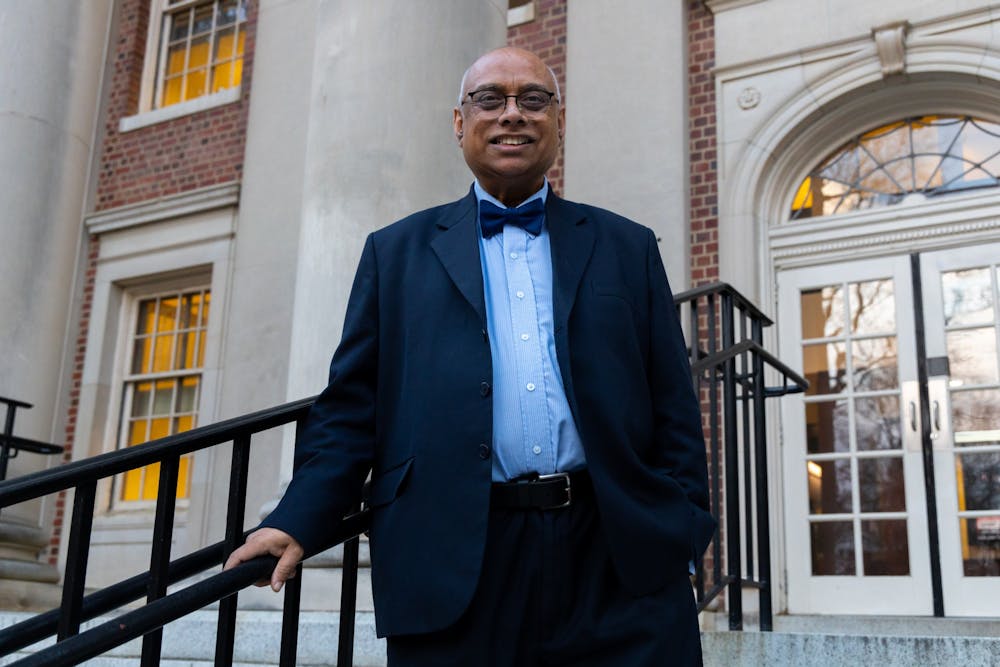At Monday's Faculty Executive Committee meeting, UNC School of Nursing clinical professor Rumay Alexander said some faculty members have expressed concerns about recent comments made by Provost Chris Clemens regarding the "Tarred Healing" photo story.
Created by photographer Cornell Watson, the photo story is a reflection of Black history through places, people and systems in Chapel Hill. It was planned to be displayed at the Sonja Haynes Stone Center for Black History and Culture but was subsequently pulled.
At a March 11 Faculty Council meeting, Clemens said he helped Watson secure the prints of his work that remained at the Stone Center and committed to him that the University would "do better in the future."
Alexander said people were upset by the way the situation was presented by Clemens at the meeting.
“People expressed that it made the staff in the Stone Center look incompetent and leadership of the Stone Center (look) incompetent,” she said. “And there's quite a disturbance about, in their perception of how we as a Council heard it versus what some who were involved knew or experienced."
Clemens was not present during this portion of the meeting. The FEC also discussed faculty salary inequities, the process for receiving emeritus status at the University, as well as the format of future meetings.
What’s new?
- Chairperson of the Faculty Mimi Chapman echoed Alexander’s remarks and said faculty members have also come to her with concerns about comments the provost made.
- “(They) did see it as undermining to the Stone Center and perhaps to Joseph (Jordan),” Chapman said.
- Chapman said that after gathering more information, she communicated the concerns in an email to Clemens Friday morning and is awaiting a response.
- “It just reviewed the ways in which the communication came across as hurtful that I'd heard from a number of people that were very concerned — the ways in which the communication played into racial history and racial tropes that were concerning," Chapman said. "And I hope that he would be able to remedy it."
- Deb Aikat, associate professor in the Hussman School of Journalism and Media, said that a stronger effort from the UNC Office for Diversity and Inclusion could help resolve some of the issues.
- “It seems like in recent years, it’s one thing after another and these do not seem to resolve, any of these diversity issues,” Aikat said. “... Truth be told, we now have a vice provost for diversity, I think that office should resolve that."
- Other members of the faculty, such as Alexander and social medicine professor Sue Estroff, said the responsibility of managing such issues falls under not just the diversity office, but the larger campus community.
- “The people who are in these offices, some of whom have been our colleagues and some of whom haven't, have a particular job, but the job belongs to every single person on this campus,” Estroff said. “We cannot just say, 'OK, this is your job. You do it.' It's everyone's job in my view.”
- The committee also discussed discrepancies in faculty salaries at UNC. This was a continuation of Friday’s Faculty Council discussion about salary equity.
- During that meeting, linguistics professor Misha Becker gave a report showing that female faculty earn less than their male colleagues, even when considering qualifications such as tenure and rank. Becker also said in her presentation that white faculty earn more on average than faculty who identify as African American, Latinx, American Indian or another racial category.
- Becker proposed creating an interdisciplinary committee to present recommendations to Chancellor Kevin Guskiewicz to help address and combat salary inequities.
- “We don’t have the ability as a committee within Faculty Council to affect change other than just talking about it,” Becker said. “I feel like there has to be a committee of faculty from all different sectors of campus that can make a recommendation to the chancellor."
- Becker said another problem in salary inequities is the accessibility of data, which could be contributing to a lack of action.
- She suggested exploring the option of creating a committee of faculty, staff and administration that has full access to this data.
- “Those reports could come back to the chancellor, because finance is under the chancellor's office, and that that would maybe give us a better chance of moving this forward,” Chapman said.
- Clemens suggested that the faculty continue to draft resolutions about salary equity. He said these resolutions express the desires and values of faculty and can be used to create expectations for deans and chairpersons at the University.
- “So, in a way, a committee is never going to substitute for the work of chairs who are held to those values,” Clemens said.
- Chapman will be presenting the salary equity report to the Board of Trustees on Wednesday.
- Secretary of the Faculty Jill Moore gave an update on the UNC Retired Faculty Association’s progress on a proposed emeritus status resolution.
- When a faculty member retires from UNC, they have to undergo a process to get emeritus status, Moore said. This status, which allows them privileges and represents them being in good standing with the University, has different processes depending on which department someone is retiring from.
- Committee members such as nutrition professor Beth Mayer-Davis said that in the past, these differing policies have interfered with retirees being granted their emeritus status.
- “There have been too many people who did not get, appropriately, the emeritus title when they retired because their department or their school or both weren’t doing what they needed to do,” Mayer-Davis said.
- The proposed resolution will be shared before the Faculty Council in April.



